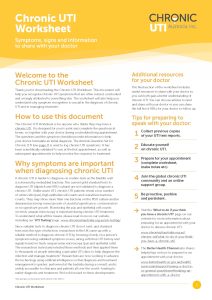Do I have a chronic UTI?

If you suspect you have a chronic UTI, treatment options in Australia are limited, but possible. Other Australians have said it is important to be proactive in your health by becoming educated about chronic UTI and sharing and discussing the information you find with your doctor. Here are some more tips Australians with chronic UTI have found useful when seeking help.
Keep track of your records
- Request and collate copies of your MSU culture, urinalysis and urodynamic test results as far back in your UTI history as you can go. Some clinics will do this free-of-charge if you make your request in person and some will require a request in writing. Other clinics have their own request application process and it sometimes involves a small fee. If you have trouble accessing your records, ask a trusted GP if they will request the test results on your behalf. This will usually get a quick response.
- Keep all your test results together in a folder organised in chronological order. Go through your results and highlight anything that stands out to you—such as white blood cell counts (leucocytes), red blood cell counts, elevated epithelial cell counts, bacterial growth explanations and any other interesting or unusual comments. It will be useful to see if you have indications of infection and any ongoing or fluctuating trends. You can learn more about what to look for on our Testing page and our FAQs.
- Think back to when your symptoms first began and try to remember if there was a trigger. Many people report their symptoms began immediately or soon after an initial acute UTI.
- The new Chronic UTI Worksheet is an easy-to-use tool developed for people navigating the challenges of chronic UTI. By providing a structured way to document symptoms, track pain and monitor treatment, the worksheet enhances communication between patients and healthcare providers. The worksheet has been reviewed and edited by Dr Sheela Swamy, PhD MRCOG. Download the worksheet and share with your doctor. Check our resources tab in the menu for other useful free downloads.
Download the Chronic UTI Worksheet
Educate yourself on chronic UTI
- Educate yourself on chronic UTI as much as your science understanding allows. You can start by reading some of the fact sheets and research articles in our resources section.
- Subscribe to our email list and you will receive a free PDF copy of the updated Understanding Chronic UTI booklet. The booklet is a condensed version of this website that you can share with your doctor.
- You can also start exploring other useful websites, such as:
- Read, highlight and re-read everything you can get your hands on. It will be useful to familiarise yourself with the medical terminology when you discuss this with your GP. If you are unsure how to pronounce some words, search the pronunciation on YouTube and practice until you feel confident.
Talk to your GP
- Book a double/long appointment with your GP so you have time to discuss your history, your symptoms, possible over-looked signs of infection from past tests, what you have learned about chronic UTI and the problems with testing from various printed papers and fact sheets from this website and others (with important points highlighted for easy reference). Mention to your doctor that MSU cultures are known to be insensitive and unreliable, and researchers have known for over 30 years that they miss at least 50 percent of the infections they test for, so perhaps your infection has been missed too.
- Some patients have reported their GP or specialist has made direct contact with one of the international chronic UTI specialist centres for information. Patients have reported good and positive experiences using this approach when partnering with a supportive and interested GP or specialist. You can learn more about these international chronic UTI specialists on this post and by talking to others in the online support and discussion groups.
- If your GP is uninterested or unwilling to learn about chronic UTI, keep searching for a GP who is kind and compassionate, interested and open to new evidence based information and, most importantly, willing to help you get better. Such GPs can sometimes be hard to find, but they do exist! An integrative doctor or functional medicine practitioner will most likely have existing knowledge of different types of intracellular/chronic infection and may be more open to the information you share with them, but the downside is their fees are usually expensive and not always covered by Medicare.
Join an online chat group for support and education
There are Australians being treated for chronic UTI who have proactively researched the disease and partner with their doctors to treat their embedded infection using antimicrobials (following a scientifically validated treatment protocol for chronic UTI), Traditional Chinese Medicine or natural therapies. You can talk to some of these people, and others who are researching and undergoing various therapies, in a number of online support/chat groups for chronic UTI. You can start by searching for UTI groups on Facebook.
The bottom line
Unfortunately, Australia is desperately lacking specialist knowledge and treatment for chronic UTI. If you suspect you have a chronic UTI, it will require some research and effort on your part to receive a diagnosis and appropriate treatment. This is far from acceptable and needs to change. However, the most important thing to focus on is being proactive, persistent and positive in striving to find the help you need. It might help you to know that other Australians have achieved this!
Please contact us if you need a little more help getting started on your journey.
If you need extra or urgent support
If you are experiencing distress or negative thoughts relating to your health condition, we encourage you to seek support from family, friends, a trusted health professional or other familiar supports. If you are needing extra support, Mind Spot is an Australian online service offering tailored psychological support for people managing chronic pain and other chronic health conditions. If you are in crisis, please contact Lifeline Australia on 13 11 14, Beyond Blue on 1300 22 4636, the national Suicide Callback Service on 1300 659 467, or the relevant mental health support organisation in your country.
.